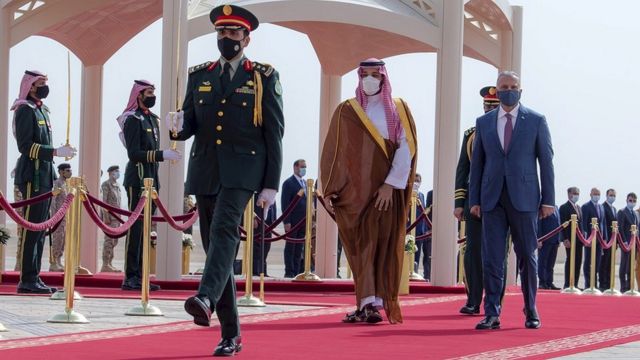Seyyed Razi Emadi told the Strategic Council on Foreign Relations that Saudi Arabia is making a lot of efforts to increase its influence in Iraq through financial means.
“There are several fundamental points in the recent visit by Mustafa al-Kazemi to Saudi Arabia. Mr. Kazemi is trying to highlight the role of ethnicity i.e. Arabism in the foreign policy of Iraq. This means when the role of ethnicity is brought into the spotlight, the role of religion will diminish.”
Emadi said Mr. Kazemi is seeking to strengthen its relations with the Arab countries, adding that he had made numerous attempts in the last 11 months to travel to Saudi Arabia. In fact, he said, Kazemi was hoping to conduct his first foreign visit to Saudi Arabia but it was impossible.
This expert of West Asia affairs said economic problems are the main challenge of Kazemi as Iraq’s prime minister, adding that “if he is able to resolve this challenge or help reduce it, his grip on power can be guaranteed; however, if he fails to find a solution, it seems he needs to say goodbye to power soon. Therefore, Kazemi has resorted to rich Arab countries such as Saudi Arabia and the United Arab Emirates to resolve this problem. In fact, all the agreements he signed in Saudi Arabia were of economic and financial nature.”
Al-Kazemi’s efforts to exploit Saudi Arabia’s financial resources
Emadi added that al-Kazemi tries to profit from the financial capabilities and resources of Saudi Arabia as he had earlier concluded contracts with Riyadh according to which some lands in the west and south of Iraq have been ceded to Saudi Arabia for agriculture and animal husbandry.
“In this visit, Saudi Arabia deposited three billion dollars in a joint fund established with Iraq. All these developments indicate that Mr. al-Kazemi tries to resolve some parts of his economic problems through Saudi Arabia and other Arab states.”
He added that there are about weight million employees in the Iraqi government who rely on oil revenues for their salaries, saying that Saudi Arabia is much interested in consolidating its relations with Iraq to exert more political influence.
“Even though Iraq and Saudi Arabia did not have diplomatic relations for 25 years, Saudi Arabia was not fully satisfied that Saddam has been deposed of power as Riyadh considered the Saddam regime as a bulwark against the influence of the Islamic Republic.”
Emadi said Saudi Arabia is trying, through boosting its economic and other relations, to stop Iran’s influence in Iraq. This is something of which Kazemi is aware, he said.
“In addition to the opposition of resistance groups in Iraq to Mr. Kazemi, he is also under pressure from the United States. The more the influence of resistance groups is diminished in the structure of power of Iraq, the more Mr. Kazemi will be satisfied and continue his rein in Iraq. Therefore, Saudi Arabia is seeking enhancement of relations with Iraq because of regional rivalry with Iran and Kazemi is trying to bolster ties with Saudi Arabia in order to resolve economic problems and have the opportunity to continue his group on power.”
Saudi Arabia’s stride to Iraq
Referring to the significance of Kazemi’s visit to Saudi Arabia, Emadi said Saudi Arabia has taken strides to Iraq in order to increase its influence in Iraq through economic and financial means and challenge the status and influence of the Islamic Republic of Iran in Iraq. The outcome of Kazemi’s visit is yet to be determined.
He quoted al-Kazemi as saying that Iraq has been successful in improving its relations simultaneously with Iran, Turkey and Saudi Arabia and added that “Kazemi has been relatively successful in this. However, I believe that he is pursuing the enhancement of relations with Turkey and Saudi Arabia more than relations with Iran. Relations between Iran and Iraq has been at a good level since the past. But Iraq has experienced highs and lows in its relations with Saudi Arabia and Turkey and Mr. Kazemi has recently tried to strengthen his relations with them”.
Saudi Arabia’s export of electricity to Iraq
Referring to the agreement between Riyadh and Baghdad to supply electricity to Iraq, he said Saudi Arabia has agreed to do this while Iraq owes Iran a lot of dues and payments for electricity.
Emadi referred to the positions of various political groups in Iraq on al-Kazemi’s visit to Saudi Arabia and said “there is no consensus among resistance groups. For example, the Friday prayers leader of Najaf has highlighted the black record of Saudi Arabia in Iraq but Muqtada al-Sadr and the Sadr movement welcomed it. In fact, those who are opposed to Saudi Arabia are adopting a security-wise approach and believe that Saudi Arabia has tried in the past to promote insecurity in Iraq and is now trying to exploit economy to pursue its policy of creating tension and insecurity in Iraq and weaken its government. Saudi Arabia support Daesh terrorism in Iraq.”
Emadi said the first Saudi ambassador to Iraq after 25 years of severance of relations was designated persona non-grata and added that some of the Iraqi groups have lost their trust in Saudi Arabia however there is no consensus in Iraq over amelioration of relations with Saudi Arabia. In fact, there are many differences in this respect, he added.










0 Comments